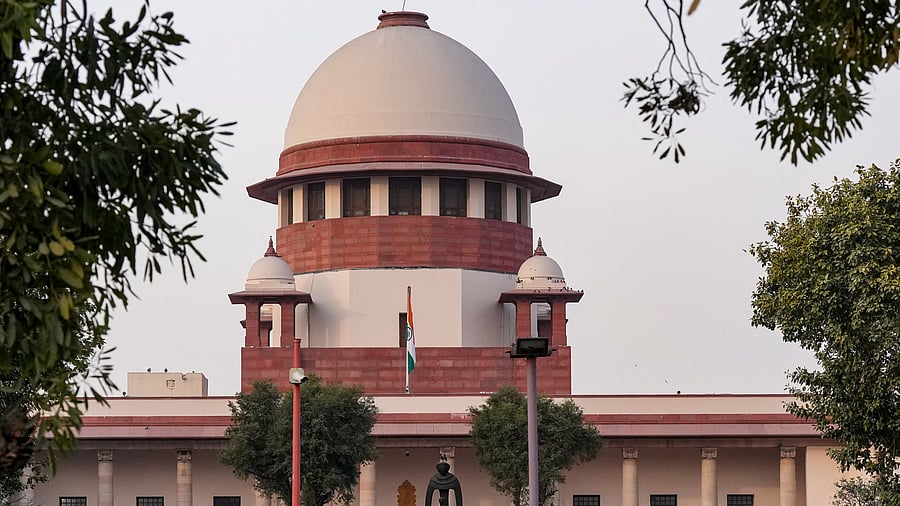
Supreme Court of India
Credit: PTI Photo
New Delhi: The Supreme Court has declined to quash criminal proceedings initiated against members of Tamil Nadu Thowheed Jamath for the use of "highly objectionable" language in praising Afzal Guru, a Parliament attack convict, and criticising judges of the apex court and the High Court.
The court, however, allowed their plea for clubbing three FIRs into one lodged at Madurai for the joint trial in the interest of justice.
Dealing with a petition filed by Rahamathulla and another person, a bench of Justices Vikram Nath and Sandeep Mehta said there is no scope for the exercise of writ jurisdiction of this court under Article 32 of the Constitution so as to quash the impugned FIRs.
"We must note that the language used by the petitioners in their speeches is highly objectionable and definitely discloses the necessary ingredients of the offences alleged," the bench said.
The bench, however, noted that the FIRs registered at Thallakulam Police Station, Madurai City, Tamil Nadu; another registered at Adiramapattinam Police Station, Thanjavur, Tamil Nadu; and yet another registered at Vidhana Soudha Police Station, Bengaluru City, Karnataka emanated from the same hate speech attributed to the petitioners.
It said the only justification for registration of the separate FIRs is that the complainants claimed to have heard the speech at their respective locations.
The court also noted the contents and language of the hate speech attributed to the petitioners are verbatim the same.
"Thus, we are of the view that allowing multiple prosecutions of the petitioners in different jurisdictions could lead to a serious anomaly with the possibility of conflicting decisions. Additionally, such a course of action would give rise to multiple trials for the same/similar set of allegations," the bench said.
The bench, however, opined it was not convinced by the submission that the subsequent FIR should be quashed as the same tantamounts to a second FIR on the same facts.
"But in any event, we feel that allowing multiple trials before Courts of different jurisdiction in reference to the speeches of the petitioners of March 17, 2022 is not expedient in the interest of justice and the trials deserve to be clubbed," the bench said.
Relying upon Amish Devgan Vs Union of India & Ors (2021), the court said since the speeches from which all the three subject FIRs emanate were delivered within the jurisdiction of Thallakulam Police Station, Madurai City, Tamil Nadu, the trial should be conducted by the court of the competent jurisdiction at Madurai, Tamil Nadu.
The court exercised powers under Article 32 read with Article 142 of the Constitution to direct that trial of the case arising from FIR registered at Vidhana Soudha Police Station, Bengaluru City, Karnataka and FIR registered at Adiramapattinam Police Station, Thanjavur, Tamil Nadu should be transferred to the court of the competent jurisdiction at Madurai, Tamil Nadu for joint trials of both the petitioners by clubbing the three FIRs.
It was alleged that the petitioners made inflammatory hate speech, with the potential to incite hatred, violence, and riots amongst the people in the name of religion. They praised Afzal Guru, a terrorist who was the mastermind behind the attack on Indian Parliament.
The petitioners also made remarks against the legal issues considered in the Ayodhya Ram Temple judgment; the dress being worn by the Chief Minister of Uttar Pradesh; the festivals being celebrated by Christians; the practice of Hindus in applying holy ash to their bodies; the religious practice followed by the Sikhs keeping a sword with them and tried to link the same with the Hijab being worn by Muslim women.
The petitioners also condemned the verdict given by the Karnataka High Court in the Hijab case and used unparliamentary language towards the judges of the Supreme Court of India as well as the High Courts.
It was alleged that the language tended to undermine the dignity, honour, and sanctity of the judiciary, with a propensity to undermine the democratic functioning of the government of India.
In their plea, the petitioners asserted that it is impermissible in law to register multiple crimes/FIRs for the same set of allegations and offences as the same is in gross violation of the right against double jeopardy guaranteed by Article 20(2) of the Constitution.
The counsel for the States of Tamil Nadu and Karnataka claimed that on account of the inflammatory nature of the hate speech, the sentiments of people at Madurai and Bengaluru city were hurt and hence, the said speech gives rise to offences at each place wherever the same was heard and the police are obligated to register the FIRs at the respective police station where the reports disclosing commission of cognizable offences are received.
They also said there is no infirmity or illegality in the registration of separate FIRs with reference to the petitioner’s speech because every communication/publication of the malevolent speech gives rise to a fresh cause of action for lodging the FIR.
